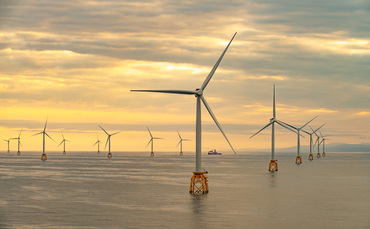

UK signs landmark Memorandum of Understanding with North Seas Energy Cooperation, as Treasury announces fresh plans to boost green economy
The UK government yesterday signed a new Memorandum of Understanding (MoU) with the North Seas Energy Cooperation (NSEC) forum to help accelerate the development of offshore wind projects in the North Sea basin.
The NSEC was formed in 2016 to bring together all the countries that border the North Sea to facilitate "the cost-effective deployment of offshore renewable energy, in particular wind, and promote interconnection between the countries in the region".
The UK quit the group post Brexit as the government severed formal ties with a host of EU-based groups, leaving Belgium, Denmark, France, Germany, Ireland, Luxembourg, Netherlands, Sweden, Norway, and the European Commission as members.
However, under the UK-EU Trade and Cooperation Agreement (TCA) agreed in 2019 the UK committed to continued co-operation with NSEC. The new MoU fulfils that commitment by enabling the UK to work with NSEC members to develop renewables projects in the North Seas.
"I'm pleased to agree even greater energy cooperation with our North Seas neighbours, which will be vital in helping the UK meet it ambitious renewables target, including increasing offshore wind fivefold to 50GW by 2030," said Energy and Climate Minister Graham Stuart. "The development of renewables in the North Seas is critical for accelerating our clean transition and boosting energy security for the UK and our European neighbours."
The government said the "landmark agreement" would set the framework for greater cooperation with North Seas neighbours, especially on plans for a supergrid in the region that would make it easier to trade power across borders.
Analysis by National Grid Electricity System Operator has previously shown that a well-integrated grid linked to offshore wind farms could deliver savings to consumers of up to around £3bn.
The news came just a day after the Treasury again underscored its commitment to the UK's green economy, with the announcement five leading industry experts have been appointed to accelerate development and deployment of emerging technologies in the UK.
Unveiled as part of a package designed to establish the "Silicon Valleys of the 21st century" in the UK, the new advisors will work with Chancellor Jeremy Hunt and chief scientific adviser and national technology adviser, Sir Patrick Vallance, to review existing rules and help develop a 'pro-innovation' regulatory approach that allows the UK to fulfil its ambition to become a science superpower.
They will focus on five areas designated as "high potentional" by the government: digital technology, green industries, life sciences, advanced manufacturing and the creative industries.
Matt Clifford, chair of the new Advanced Research and Invention Agency (ARIA), and Priya Lakhani, a member of the AI Council, have been appointed to support work to harness new digital technology such as artificial intelligence.
Sir John Bell, who is on Genomics England's board of directors, and Camilla Fleetcroft, Eclevar UK's vice-president of clinical and regulatory affairs, will work on cultivating the life sciences sector and help drive the next generation of discoveries, such as delivering genomics-enabled clinical trials.
Meanwhile, Jane Toogood, chief executive of Catalyst Technologies at Johnson Matthey, will take forward work on building green industries like hydrogen and battery development in the UK.
"I want British firms to lead the world in turning fantastic science into new products and services - and we need to make sure government is doing everything we can to encourage innovation and competition," said Hunt. "We have already set out how we will back our formidable financial services sector to unlock private investment in new industries, and we will show the same ambition in other high-growth sectors to ensure that future Silicon Valleys are based here in the UK.
"The countries that secure leadership in new technologies will lead the world, enjoying unparalleled growth, security and prosperity for decades to come - and it is our job to ensure the UK is able to fully reap the rewards."
* This article was originally published here
Comments
Post a Comment